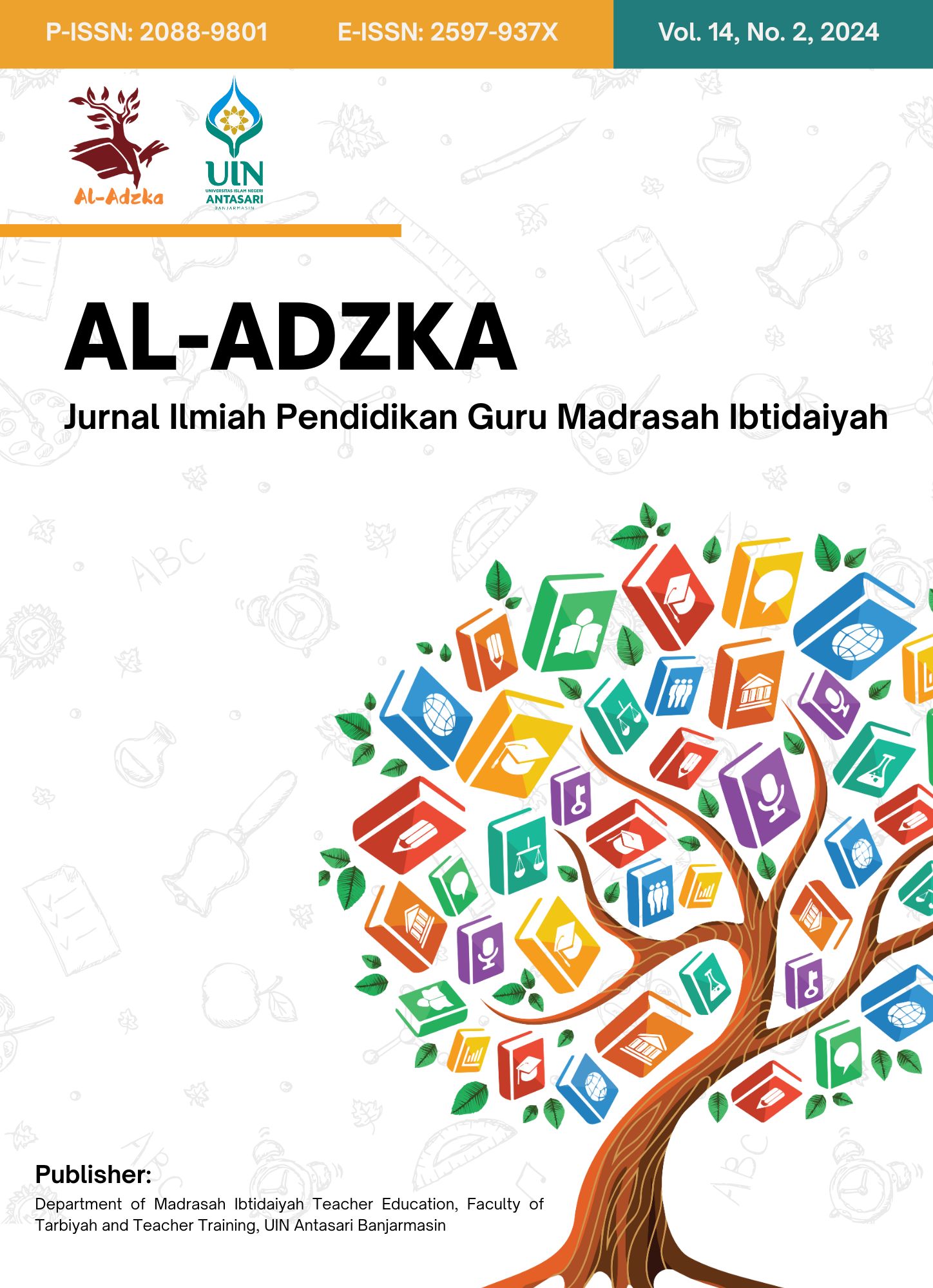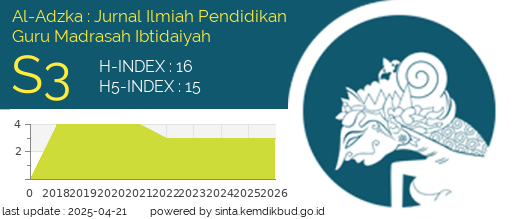Examining the Development of Social Skills in First-Grade Elementary School Children
DOI:
https://doi.org/10.18592/aladzkapgmi.v14i2.13868Keywords:
Communicative Ability; Conflict Resolution Ability; First Graders; Social Skills; Social and Emotional LearningAbstract
This study explores how social skills are performed among first-grade elementary school children, focusing on key competencies such as communication, cooperation, and conflict resolution. Through qualitative observations and analyses, the study examines how individual differences influence children's social interactions and ability to adapt to structured educational environments. The data were collected using interview guides and documentation, which were later analyzed using thematic analysis. The findings reveal that there are three significant notes. First, regarding the communication pattern, the children are more intimate and relaxed when talking to peers and feel more serious when talking to teachers. Second, their ability to cooperate is shown in taking turns. Third, in resolving the anger conflict, they mostly stay silent, believing that it will disappear, and they find their teachers to help end the conflict. It is later concluded that first-grade children adapt their social skills based on context, showing different communication styles, cooperation, and conflict-resolution strategies with peers and adults. This implies that school teachers must pay attention to the student's ability to develop their social skills.References
Abdul-Majied, S., Kinkead-Clark, Z., & Burns, S. C. (2023). Understanding Caribbean early childhood teachers’ professional experiences during the COVID-19 school disruption. Early Childhood Education Journal, 51(3), 431–441. https://doi.org/10.1007/s10643-022-01320-7
Ābele, A., Tauriņa, A., Zīriņa, T., & Rutkovska, D. (2021). Promotion of children’s cooperation and physical development in the pre-school outdoor space. Human, Technologies and Quality of Education, 2021, 571–579. https://doi.org/10.22364/htqe.2021.44
Adeliana, F., Sintawati, M., & Anggara, R. (2021). Problem-based learning: Alternative learning model to improve students’ critical thingking Ability. Al-Adzka: Jurnal Ilmiah Pendidikan Guru Madrasah Ibtidaiyah, 11(2), 93–102. https://doi.org/10.18952/aladzkapgmi.v11i2.5012
Almah, A., & Sholeh, M. (2023). Teacher Skills in Teaching Low-Grade Class on Thematic Learning at MI Nurul Islam Pemurus Baru. Al-Aulad: Journal of Islamic Primary Education, 6(2), 84–94. https://doi.org/10.15575/al-aulad.v6i2.28350
Baker, J. K., Fenning, R. M., Crnic, K. A., Baker, B. L., & Blacher, J. (2007). Prediction of social skills in 6-year-old children with and without developmental delays: Contributions of early regulation and maternal scaffolding. American Journal on Mental Retardation, 112(5), 375–391. https://doi.org/10.1352/0895-8017(2007)112[0375:POSSIY]2.0.CO;2
Budyartati, S. (2016). Development of social skill scale for early childhood. Premiere Educandum : Jurnal Pendidikan Dasar Dan Pembelajaran, 5(01), 139–154. https://doi.org/10.25273/pe.v5i01.330
Damayanti, A., Priyanti, N., Iswan, I., & Rahmawati, L. (2022). Increasing social skill children aged 4-5 with the chaterpillar game. Jurnal Obsesi : Jurnal Pendidikan Anak Usia Dini, 6(3), 2404–2410. https://doi.org/10.31004/obsesi.v6i3.1855
Dawadi, S. (2020). Thematic analysis approach: A step by step guide for ELT research practitioners. Journal of NELTA, 25(1–2), 62–71. https://doi.org/10.3126/nelta.v25i1-2.49731
Faizah, C., & Ismail, N. M. (2011). Moral values in finding nemo movie Linguistics and Literature Journal, 4(2), 2723–7273. http://jim.teknokrat.ac.id/index.php/linguistics_and_literature/index
Fikri, M., & Tegeh, I. M. (2022). The impact of social skills training on the ability to cooperate in early childhood. Indonesian Values and Character Education Journal, 5(1), 32–41. https://doi.org/10.23887/ivcej.v5i1.44227
Gabrito, R. C., Ibañez, R. Y., Frederick Velza, J. P., Campus, C., & Espinosa Sr, E. B. (2023). Impact of online gaming on the academic performance of DEBESMSCAT-Cawayan campus students. Scientific Journal of Informatics, 10(4), 423. https://doi.org/10.15294/sji.v10i4.45007
Huriyah, H. (2019). Menumbuhkan sikap sosial melalui pembelajaran IPS siswa SD home schooling Primagama Banjarmasin. Al-Adzka: Jurnal Ilmiah Pendidikan Guru Madrasah Ibtidaiyah, 9(2), 75–84. https://doi.org/10.18592/aladzkapgmi.v9i2.3273
Indriyani, I. E., Syaharuddin, S., & Jumriani, J. (2021). Social interaction contents on social studies learning to improve social skills. The Innovation of Social Studies Journal, 2(2), 93. https://doi.org/10.20527/iis.v2i2.3085
Józsa, K., Oo, T. Z., Borbélyová, D., & Józsa, G. (2023). Social skills development in children aged 4-8 years: a cross-country comparison of Hungary and Slovakia. ICERI2023 Proceedings, 1(November), 3326–3335. https://doi.org/10.21125/iceri.2023.0870
Kamma, C. A. S., & Yusuf, I. (2024). Penguatan Emosional Intellegence Siswa di SMK Al-Ikhlas Balikpapan. Journal of Educational Research and Practice, 2(2), 32–41. https://doi.org/10.70376/jerp.v2i2.98
Khusnidakhon, K. (2021). The importance of enhancing social skills of preschoolers. European Scholar Journal (ESJ), 2(3), 2660–5562. https://scholarzest.com/index.php/esj/article/view/325
Likhar, A., Baghel, P., & Patil, M. (2022). Early Childhood Development and Social Determinants. Cureus, 14(9), 1–6. https://doi.org/10.7759/cureus.29500
Munir, J., Faiza, M., Jamal, B., Daud, S., & Iqbal, K. (2023). The impact of socio-economic status on academic achievement. Journal of Social Sciences Review, 3(2), 695–705. https://doi.org/10.54183/jssr.v3i2.308
Muzaini, M. C. (2023). Implementation of blended learning model through wordwall application in improving critical thinking of islamic elementary school students. Jurnal Ilmiah Pendidikan Guru Madrasah Ibtidaiyah, 13(2), 146–158. https://doi.org/10.18952/aladzkapgmi.v13i2.10880
Ndijuye, L. G. (2022). Developing conflict resolution skills among pre-primary children: Views and practices of naturalized refugee parents and teachers in Tanzania. Global Studies of Childhood, 12(2), 159–169. https://doi.org/10.1177/2043610619832895
Petkou, D., Martini, Ε., & Eleftheroudi, A. (2024). Mediation in conflict situations among early childhood children. Research on Preschool and Primary Education, 2(1), 69–77. http://dx.doi.org/10.55976/rppe.22024128469-77
Procel, G. J. O., Tacuri, M. A. P., López, K. A., & Criollo, P. I. C. (2023). The influence of cultural context on English teaching. Ciencia Latina Revista Científica Multidisciplinar, 7(4), 784–800. https://doi.org/10.37811/cl_rcm.v7i4.6920
Rahmawati, L., Mahmudah, M., Tamjidnor, T., & Sholeh, M. (2023). The relationship between learning activeness and student learning outcomes in Al-Quran Hadith subject. Human, Technologies and Quality of Education, 2021, 12(2), 121–129. https://doi.org/10.18952/aladzkapgmi.v12i1.7713
Rashid, T. (2010). Development of social skills among children at elementary level. Bulletin of Education and Research, 32(1), 69–78.
Salimi, M., & Fauziah, M. (2023). Skills in early childhood and primary schools : A systematic review. Jurnal Ilmiah Peuradeun, 11(2), 441–472. https://journal.scadindependent.org/index.php/jipeuradeun/article/view/930/757
Septiningtyas, R., & Kholis, N. (2023). Faktor determinan kesulitan membaca pada diswa lelas 1 MIN 1 Trenggalek. Journal of Educational Research and Practice, 1(1), 44–59. https://doi.org/10.70376/jerp.v1i1.29
Simion, A. (2023). The impact of socio-emotional learning (SEL) on academic evaluation in higher education. Educatia 21, 24, 109–117. https://doi.org/10.24193/ed21.2023.24.11
Sohrabi, T. (2021). Power of play: How playing affects cooperation skills. Brock Education Journal, 31(1), 70–90. https://doi.org/10.26522/brocked.v31i1.889
Sugianto, R. (2021). Pragmatic comparison on Javanese and western politeness in cross-cultural communication. Jurnal Pendidikan Dan Dakwah, 3(1), 34–45. https://ejournal.stitpn.ac.id/index.php/pandawa
Supriatna, E., Hanurawan, F., Eva, N., Rahmawati, H., & Yusuf, H. (2024). Analyzing factors affecting social skills development among students in indonesian schools. Islamic Guidance and Counseling Journal, 7(1), 1–16. https://doi.org/10.25217/0020247447100
Veldman, M. A., Doolaard, S., Bosker, R. J., & Snijders, T. A. B. (2020). Young children working together: Cooperative learning effects on group work of children in Grade 1 of primary education. Learning and Instruction, 67(July 2019), 101308. https://doi.org/10.1016/j.learninstruc.2020.101308
Višnjić Jevtić, A., Lapat, G., & Galinec, M. (2018). The role of early childhood education in developing social competence of roma children. Croatian Journal of Education, 20(Special Edition 3), 77–91. https://doi.org/10.15516/cje.v20i0.3323
Downloads
Published
How to Cite
Issue
Section
License
Copyright (c) 2024 Nyak Mutia Ismail, Zaiyana Putri, Moriyanti Moriyanti, Endah Anisa Rahma

This work is licensed under a Creative Commons Attribution 4.0 International License.
Authors who publish with this journal agree to the following terms:
- Authors retain copyright and grant the journal right of first publication with the work simultaneously licensed under a Creative Commons Attribution 4.0 International that allows others to share the work with an acknowledgement of the work's authorship and initial publication in this journal.
- Authors are able to enter into separate, additional contractual arrangements for the non-exclusive distribution of the journal's published version of the work (e.g., post it to an institutional repository or publish it in a book), with an acknowledgement of its initial publication in this journal.
- Authors are permitted and encouraged to post their work online (e.g., in institutional repositories or on their website) prior to and during the submission process, as it can lead to productive exchanges, as well as earlier and greater citation of published work.












